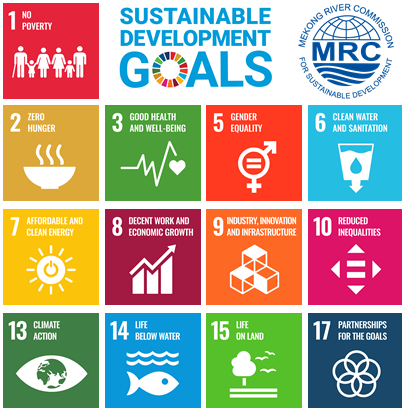Sustainable Development Goals
The Strategic Priorities and Outcomes for basin development and management in the next sections are directed at contributing to the achievement of relevant Sustainable Development Goals. Water resources development and management can contribute to No Poverty (Goal 1), Zero Hunger (Goal 2), Good Health and Well Being (Goal 3), Gender Equality (Goal 5), access to Clean Water and Sanitation (Goal 6) and Affordable and Clean Energy (Goal 7). At the same time, the following Goals are supported by actions taken in water and water-related sectors: Decent Work and Economic Growth (Goal 8), Industry, Innovation and Infrastructure (Goal 9), Reduced Inequalities (Goal 10) Climate Action (Goal 13), Life Below Water (Goal 14), and Life on Land (Goal 15). Partnerships for the Goals (Goal 17) are essential to achieving the other goals, including through regional cooperation in the basin. Although all the above Sustainable Development Goals are relevant to the Mekong River Basin Vision, the targets and indicators specified for each Goal can be used to identify those most impacted by regional cooperation on water resources through the Basin Development Strategy.
Click to SDGs to learn more on what the MRC is working on.
Sustainable Development Goals (SDGs) with Targets most directly relevant to regional water resources development and management in the Mekong River Basin
ENVIRONMENT

Targets
6.6 Protect and restore water-related ecosystems, including mountains, forests, wetlands, rivers, aquifers and lakes.
15.1 Ensure the conservation, restoration and sustainable use of terrestrial and inland freshwater ecosystems and their services, in particular forests, wetlands, mountains and drylands, in line with obligations under international agreements.
15.9 Integrate ecosystem and biodiversity values into national and local planning, development processes, poverty reduction strategies and accounts
SOCIAL

Targets
1.b Create sound policy frameworks at the national, regional and international levels, based on pro-poor and gender-sensitive development strategies, to support accelerated investment in poverty eradication actions.
2.4 By 2030, ensure sustainable food production systems and implement resilient agricultural practices that increase productivity and production, that help maintain ecosystems, that strengthen capacity for adaptation to climate change, extreme weather, drought, flooding and other disasters and that progressively improve land and soil quality.
5.c Adopt and strengthen sound policies and enforceable legislation for the promotion of gender equality and the empowerment of all women and girls at all levels.
6.1 By 2030, achieve universal and equitable access to safe and affordable drinking water for all.
6.2 By 2030, achieve access to adequate and equitable sanitation and hygiene for all and end open defecation, paying special attention to the needs of women and girls and those in vulnerable situations.
17.18 By 2020, enhance capacity-building to developing countries … to increase significantly the availability of high-quality, timely and reliable data disaggregated by income, gender, age, race, ethnicity, migratory status, disability, geographic location and other characteristics relevant in national contexts.
ECONOMIC

Targets
2.4 By 2030, ensure sustainable food production systems and implement resilient agricultural practices that increase productivity and production, that help maintain ecosystems, that strengthen capacity for adaptation to climate change, extreme weather, drought, flooding and other disasters and that progressively improve land and soil quality.
7.2 By 2030, increase substantially the share of renewable energy in the global energy mix.
8.5 By 2030, achieve full and productive employment and decent work for all women and men, including for young people and persons with disabilities, and equal pay for work of equal value.
9.1 Develop quality, reliable, sustainable and resilient infrastructure, including regional and trans-border infrastructure, to support economic development and human well-being, with a focus on affordable and equitable access for all
CLIMATE CHANGE

Targets
1.5 By 2030, build the resilience of the poor and those in vulnerable situations and reduce their exposure and vulnerability to climate-related extreme events and other economic, social and environmental shocks and disasters.
13.1 Strengthen resilience and adaptive capacity to climate-related hazards and natural disasters in all countries.
13.2 Integrate climate change measures into national policies, strategies and planning.
COOPERATION

Targets
6.5 By 2030, implement integrated water resources management at all levels, including through transboundary cooperation as appropriate.
17.9 Enhance international support for implementing effective and targeted capacity-building in developing countries to support national plans to implement all the Sustainable Development Goals, including through North-South, South-South and triangular cooperation.
17.14 Enhance policy coherence for sustainable development.
